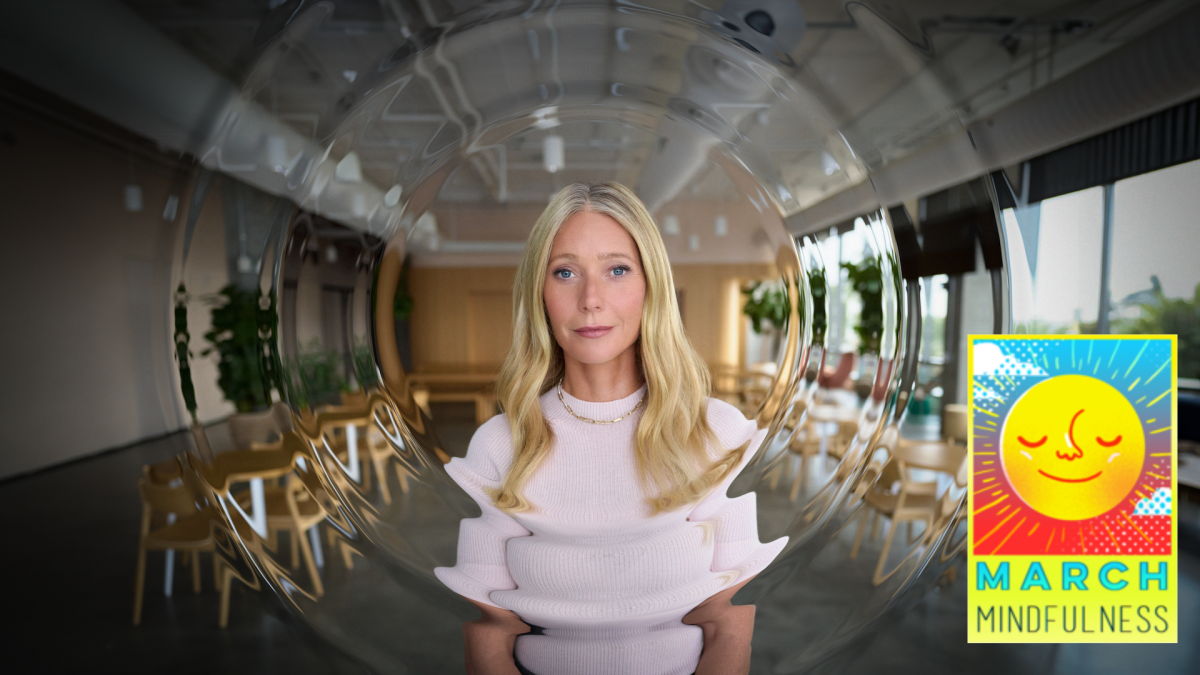
Gwyneth Paltrow’s new wellness routine is eyes-open meditation — with an app.
March Mindfulness is an annual Mashable series that explores the intersection of meditation practice and technology.
What does whipping up a nice bowl of creamy guacamole have in common with pushing your child on the swing set, and with just plain old walking around?
Answer: they’re all perfect opportunities to meditate with eyes wide open, according to Gwyneth Paltrow. And the famed actor and Goop guru isn’t wrong, even if some of her examples say as much about her as the practice of mindfulness.
Practicing awareness by meditating in our busy, everyday-life moments — with eyes alert, not just when we have our eyes closed on a yoga mat or pillow, in other words — is pretty much the definition of mindfulness. But most meditation apps treat meditation as devotional. “Close your eyes,” their meditations often instruct. The apps have been slow to, uh, reach awareness on eyes-open meditation — this recent blog post from Calm being a notable exception.
Now here comes Moments of Space, an app that’s technically been around since 2022, but seems to keep overhauling itself in search of a reason to stand out from the crowd. A new focus on eyes open meditation is one good one; its AI-assisted daily meditation practice, quietly launched last week, may be another.
The coordinated launch of Paltrow’s partnership with the app, however, was not so quiet.
‘Really changed my life’
“The eyes open meditation practice has really changed my life,” Paltrow said during an embargoed webinar for the media. “I find all day, every day, I can just steal a few minutes here and there. I can be at my desk, walking down the hall, on a Zoom, and I can meditate.”
Which is great, so far as it goes. The app’s new celeb collaborator led a short eyes open meditation as example, briefly held up by Paltrow needing her team to bring her a script (she’s a self-proclaimed newbie to the practice). And then raised more questions than she answered by describing a “charged work experience” in which she began to open-eye meditate in order to reduce her “reactionary impulses.” No further details were forthcoming.
Paltrow leads a series of similar meditations on the app, incorporating an against-the-grain philosophy of eyes-open, visually-oriented meditation. Presumably, she doesn’t spill on which Hollywood co-star or Goop executive infuriated her. Access to Paltrow’s meditations was requested, but the company would only provide them after the official launch time. We’ve investigated the walking meditations the app does already provide; more on that in a moment.
Paltrow famously devotes large sectors of her life to meditation, but just as famously devotes herself to distracting hype around various wellness products. Can she bring it out of the realms of woo-woo or fad, and back to the helpful mindfulness of everyday moments?
Based on the app’s new promotion reel, the evidence is mixed, the message muddy. A mindful explanation of mindfulness this ain’t.
“What do you see?” Paltrow’s disembodied voice says to her eyes-open self, which is calmly sitting in what looks like a wood-paneled co-working space. “I see a pathway toward infinite space, connecting me with everything and everyone,” replies one man.
Um, okay?
“I see the energy in every action,” says someone else.
Sure, but that’s not really —
“I see myself, but differently,” retorts a nameless woman, perhaps the one on screen floating peacefully in a lake.
“I see more of each and every moment,” Paltrow concludes, back in the not-WeWork. “And all I have to do is open my eyes.”
Eyes Wide Open, the app
The app’s founder, Kim Little, explained the concept of eyes-open meditation a little more directly than Paltrow.
Citing its foundations in Dzogchen and Mahamudra Tibetan Buddhism, backing it up with psychological principles, Little says eyes-open meditation involves learning to see past our visual distractions and find calm amid sensory stimulation.
“Modern society is defined as distraction,” Little said, noting our devotion to screen time while staring at us on a screen. “Visual distraction is one of the most powerful forms.” And yet “shutting off the visual sense” — that is, by treating meditation as a devotional practice, the way most apps do — “means we don’t learn mindfulness where we need it most.”
Visual meditation works with the problem of modernity, not against it, Moments of Space argues. It is a “more practical, more accessible, more relevant” option for a distracted age.
“We approach meditation through separating off time from our day,” says Little. “The problem is, even if we find the time, the effects tend to fade. The 20 minutes of mindfulness competes with 16 hours of mindless practice. We need a ‘little but often’ approach to meditation.”
Using the “abundance of time” that fills the more mindless moments of our day — like brushing our teeth, commuting, or doing chores — people can more easily incorporate the bite-sized ethos and self-regulate better.
A quick review
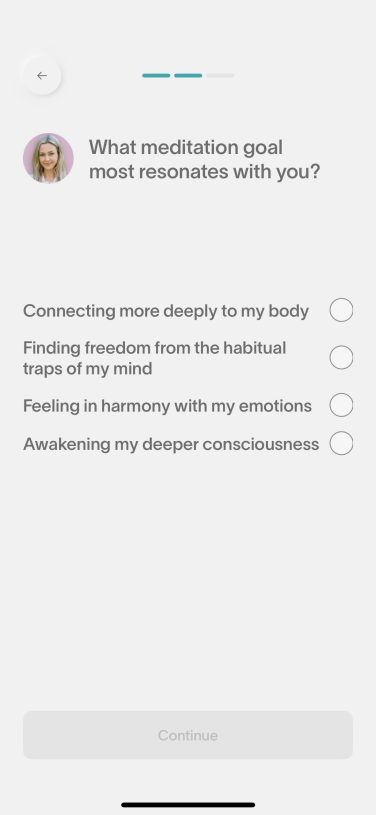
Credit: Moments of Space
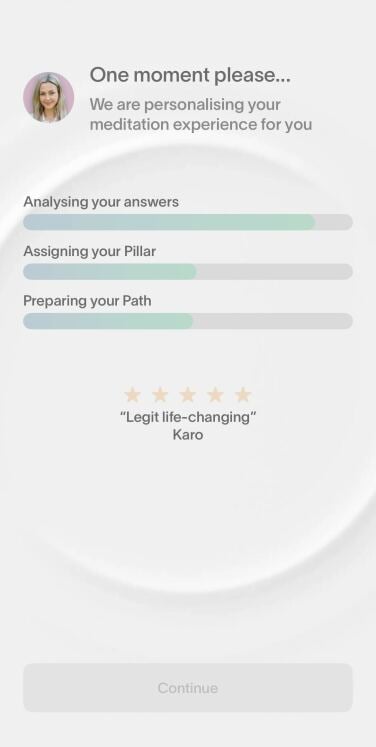
Credit: Moments of Space
How does Moments of Space work in practice? Well, as with the Paltrow ad, there are some strange choices you have to scrape away before arriving at the actually useful stuff.
Take Alisha, a Paltrow-esque Clippy who appears to walk you through the app. Then there’s the oddly-worded meditation goals screen, above left, which cannot be skipped. Nor can you choose more than one goal.
Something that can be skipped is the screen that forces you to sign up for a free trial, so long as you quit out of the app at that point and reload. The “free” version of the app gives you access to around a dozen pieces of content, four of which are eyes-open specific.
Something else that can be skipped is the app’s desire to track you, ostensibly so it can know when you’re out walking and nudge you to meditate then.
(Moments of Space notes in its privacy policy that it collects personal data such as “your location, your physical activity, how much you use our app, and any content you share,” as well as motion data collected by device sensors. Little says he believes nudges are crucial to “awakening” the world to the benefits of mindful meditation.)
But then? The first, free, actual eyes-open walking meditations in the app were … delightful. We tested them with the first non-Alisha option, the voice of Stefan, an otherwise unidentified Brit very much in the same vocal realm as Andy Puddicombe, the voice and co-founder of Headspace.
In the carefully-staggered short bite meditations, Stefan’s suggestions did not have the condescending tone of many guided meditations (such as the few non-Paltrow, Goop-sponsored meditations we had access to in the app.)
Instead, his advice came across as directed attention: Notice how your feet connect to the Earth, how you arms swing; now look at shapes and colors, now listen to sounds both calming like birdsong or annoying like traffic. Now notice your inner thoughts.
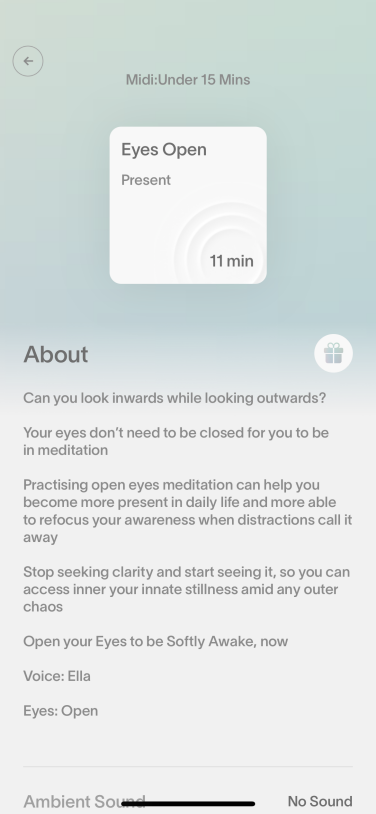
Credit: Moments of Space
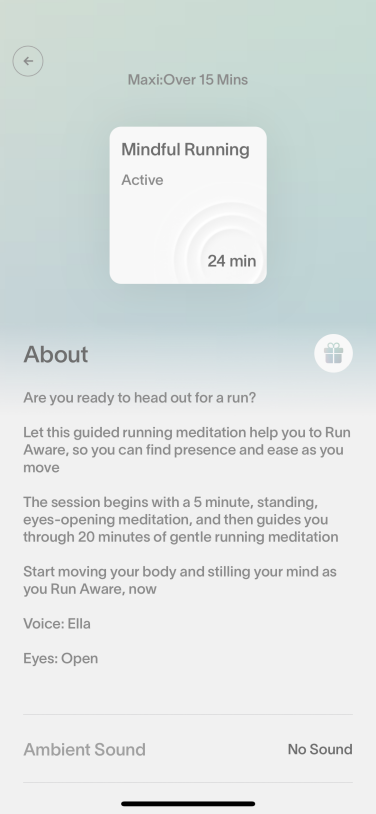
Credit: Moments of Space
AIs wide open
Then there’s the AI element, because apparently we’re not over the AI hype thing yet. It’s “the future” of, according to many, everything. Moments of Space uses an undisclosed AI model and machine learning to personalize its eyes open experience.
Little, a meditation advocate and software developer, says there’s pressing need for a personal AI assistant specifically trained to help detect those personality traits and build mindfulness. He proposes using Large Language Models (LLMs) that are fine-tuned on wisdom teachings across Christianity, Buddhism, psychology, and neurology.
SEE ALSO:
How to choose a meditation app that’s right for you
The app’s AI could — with continued investment! — pinpoint both the “dominant negative traits” and fleeting, “transient personality traits” of the individual, using a model built on the language and daily habits of the app’s users. That means personalized eyes-open mindfulness routines that both engage and break down those traits.
“An overactive mind is a very common personality trait,” Little says. “Someone who has a busy mind shouldn’t be doing a mindfulness of breath meditation, but a mindfulness of thought meditation — creating space around thoughts. They’re not being given the right thing for that trait.”
Paltrow, ultimately, was more grandiose.
Asked how she views the intersection of tech and mindfulness, Paltrow connected the data-gathering potential of tech, like the Oura ring she says helps track her meditation, with practice’s ability to heal the world’s divisions.
“When in a meditative state, I feel a oneness, so much,” she said. “I think a connection to that oneness intrinsically heals that division. You feel the interconnectedness of every human being, and it brings empathy to the forefront. With AI, things are going to change quickly moving forward. We need to embrace tech. Tech being able to help us hold data lets us go further.”
Moments of Space offers limited free content, as well as a paid app subscription, and is available for iOS download here.


